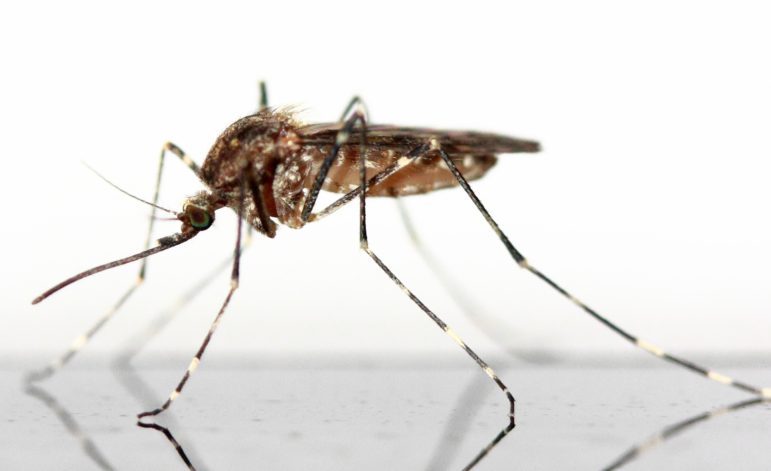
The following announcement came from the Mass. Department of Public Health:
The Massachusetts Department of Public Health (DPH) announced Tuesday two additional human cases of West Nile virus (WNV) in Massachusetts this year, bringing the total number of human cases to four. Both people are males in their 60s. One was exposed in Suffolk County in an area known to be at increased risk. The other was exposed in Norfolk County.
As a result, multiple communities in the area have been raised to high risk for WNV: Cambridge, Everett, Medford, Newton, Somerville, and Watertown in Middlesex County, and Brookline, Milton, and Quincy in Norfolk County have been raised to high risk for WNV.
“We are currently in the peak time for West Nile virus activity in Massachusetts, which will continue into September. As the amount of disease in mosquitoes increases, so do the chances for human infection,” said Public Health Commissioner Robbie Goldstein, MD, PhD. “It is important that people throughout the state continue to take steps to avoid mosquito bites. The risk of West Nile virus in Massachusetts will not go away until the first hard frost.”
The first WNV human case announced this year was exposed in Hampden County; the second case was exposed in Middlesex County. No animal cases of WNV have been detected so far this year.
WNV is usually transmitted to humans through the bite of an infected mosquito. There were six human cases of WNV in 2023.
There have been 262 WNV-positive mosquito samples so far this year detected from Barnstable, Berkshire, Bristol, Dukes, Essex, Hampden, Middlesex, Norfolk, Plymouth, Suffolk, and Worcester counties. The risk of human infection with WNV is moderate or high in the Greater Boston area (Middlesex, Norfolk, and Suffolk counties) and is also elevated in parts of Barnstable, Bristol, Essex, Hampden, Plymouth, and Worcester counties.
“At least 32 other states have also reported human cases of WNV this year,” said State Epidemiologist Dr. Catherine M. Brown. “While not everyone will get sick from WNV, people over the age of 60 and those with certain chronic medical conditions are more likely to develop severe illness. We encourage everyone to take steps to prevent mosquito bites for yourself and your loved ones.”
People have an important role to play in protecting themselves and their loved ones from illnesses caused by mosquitoes.
Avoid Mosquito Bites
Apply Insect Repellent when Outdoors. Use a repellent with an EPA-registered ingredient, such as DEET (N,N-diethyl-m-toluamide), permethrin, picaridin (KBR 3023), or oil of lemon eucalyptus (p-menthane-3,8-diol (PMD) or IR3535) according to the instructions on the product label. DEET products should not be used on infants under two months of age and should be used in concentrations of 30 percent or less on older children. Oil of lemon eucalyptus should not be used on children under three years of age.
Be Aware of Peak Mosquito Hours. The hours from dusk to dawn are peak biting times for many mosquitoes. Consider rescheduling outdoor activities that occur during evening or early morning in areas of high risk.
Clothing Can Help Reduce Mosquito Bites. Wearing long sleeves, long pants and socks when outdoors will help keep mosquitoes away from your skin.
Mosquito-Proof Your Home
Drain Standing Water. Mosquitoes lay their eggs in standing water. Limit the number of places around your home for mosquitoes to breed by draining or discarding items that hold water. Check rain gutters and drains. Empty unused flowerpots and wading pools and change the water in birdbaths frequently.
Install or Repair Screens. Keep mosquitoes outside by having tightly fitting screens on all windows and doors.
Protect Your Animals
Animal owners should reduce potential mosquito breeding sites on their property by eliminating standing water from containers such as buckets, tires, and wading pools – especially after heavy rains. Water troughs provide excellent mosquito breeding habitats and should be flushed out at least once a week during the summer months to reduce mosquitoes near paddock areas. Horse owners should keep horses in indoor stalls at night to reduce their risk of exposure to mosquitoes. Owners should also speak with their veterinarian about mosquito repellents approved for use in animals and vaccinations to prevent West Nile virus (WNV) and EEE. If an animal is suspected of having WNV or EEE, owners are required to report to the Department of Agricultural Resources, Division of Animal Health by calling 617-626-1795, and to the Department of Public Health by calling 617-983-6800.
More information, including all WNV and EEE positive results, can be found on the Arbovirus Surveillance Information web page at Mosquito-borne Diseases | Mass.gov, which is updated daily, or by calling the DPH Division of Epidemiology at 617-983-6800.
What you can do to prevent WNV infection
1. Be prepared: Know your risk – check this page regularly, repair screens, clean up to get rid of mosquito breeding sites, be aware of stagnant water on private property (e.g. unused swimming pools) and consult the local board of health.
2. Wear long sleeves and long pants from dusk to dawn when weather permits
3. Use mosquito netting on baby carriages and playpens
4. Wear mosquito repellent when outdoors, especially between dusk and dawn
5. Dump standing water twice weekly
6. People over 50 or those who are immune compromised should adjust outdoor activity to avoid peak mosquito hours (from dusk to dawn)